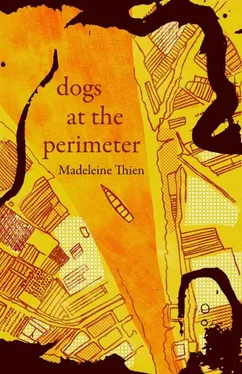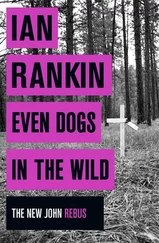Kiri gave me a drawing to bring with me.
I touched the blue, waxy openness. “The sky,” I said. “Or maybe the ocean?”
He nodded. “It goes off the edge of the page.” At school, he said, they had been looking at images from the Hubble telescope. “See? Like a galaxy, and you can go forever but the universe, it just never ends.”
He looked at Taka the Old, who would be staying with them while I was away. When they left for Vancouver, Navin’s sister would come to house-sit. “This cat has a big nose,” he said, suddenly interested. “Like a rabbit.”
“You’re part of us,” Navin told me when I left. “We’re your family. We have to find a way.”
Now, the flight attendant hands out ice cream that we eat with spoons shaped like tiny wooden paddles. I pace up and down in the aisles, between one set of dark blue curtains and another. Nearly everyone is sleeping, heads turned to the side. Hours later, as we are lowering toward Vietnam, I can see the Mekong River, I see temples like patches of gold, the delicate crowns of trees, dry fields ready for the next season. I breathe it in, this landscape so like Cambodia’s, like a painting I memorized long ago, shade by shade, curve after curve. Gamboge, the colour, was named by Flemish painters some three hundred years ago, after my country, Kampuchea. Cambodia. Deep yellow, burned orange, saffron, the colour of the monk’s robes, of tigers and the petalled eaves of the Khmer temples. I can’t stop looking. I am trying to follow this path to its end, I am trying to continue by buying a ticket, pushing my bag through the X-ray scanner, folding myself into the impossible drawer of seat 23D, flying away from Montreal, through the rough turbulence that joins these continents. In Saigon, when we exited the airplane, heat came suddenly, thick and heavy. In the airport, I drank tea. I bought postcards of the south coast. Women in ao dai and women in slacks, men my father’s age, businessmen in polyester suits, the ones who had survived the long wars and now crossed and recrossed the sky, hurried past me. A juddering, unhappy plane carried me north to Vientiane, Laos, and from there I took a bus twelve hours over the mountains. A wet humidity enveloped us. I could not understand the language. Some Lao words drew images in my thoughts but most were puzzles to me. This country was so mesmerizing, the bus climbed up into the mountains, slowing in the high altitudes, descending through limestone valleys and supine clouds. There was a woman on the road with her worried chickens. Little children torpedoed baguette sandwiches through the windows of the bus in return for a few thousand kip. I imagined Kiri here. Where are you going? a woman asked me. I don’t know, I said. She smiled and smiled. I cried and no one noticed. I wanted to go home but this was as close as I could bring myself, floating by sea, floating in air.
The bus carried me to the ancient city of Luang Prabang, where I stayed for two nights, waiting, thinking. In my bare hotel room, I spoke to Navin. We talked about our son. Navin told me about the years in Malaysia, after his father had passed away, and he and his sister were left to raise themselves. He told me details that we had never shared before, afraid of pity or misunderstanding, unwilling to give meaning to the past. I fell asleep thinking of telescopes, microscopes. Galileo and his polished mirrors, how they carried, magically, more visible light to the eye, making the tiny things large, and the distant stars near. How they collapsed space and time. The next morning, I arranged a ride to the village that Nuong had described to me, a dirt road with fifteen or twenty wooden houses and two small restaurants. By then it was late February, almost three months since Hiroji had disappeared. I was let off beside the village temple and the truck driver, a boy in his late teens, smiled at me wistfully. It was Monday, late afternoon. When the truck heaved away, the rising dust hung before me. A tired light veiled the temple, which was painted red and gold, lush as a woman’s fancy dress, like a tirade against the brown landscape. I waited. This village was so small, news would spread within a few minutes that a stranger was here. I stood beneath a blossoming tree and children came out of nowhere to peek at me, and I wondered if I had been like this, Sopham and I, fascinated by the strangers on the riverfront, with all our lives ahead of us. My mother once told me that we are born, into the world, whole. Year by year, our heads grow crowded with too many voices, too many lives. We begin to splinter apart. We take in too much, too many people and places, we try to keep them inside us where the world won’t alter them.
This is what I saw then: a Japanese man wearing a light blue, pinstriped shirt, creased as if it has just come from the store, and dark slacks. He wore no hat, carried no cane, had neither glasses nor sunglasses. His loafers were scuffed. He was clean-shaven, thin in a ragged way, he walked well but slowly, his face was sun-darkened and deeply lined.
He came toward me, the same as I remembered but softer, older. Another man stood behind him, so alike in appearance, so different in bearing. It must be a trick of light, I thought, we are separating and merging, intersecting and dividing.
“Janie,” Hiroji said. “Is that you?”
My friend held me for a long time.
“Don’t cry,” he said. “You’re here.”

In James’s house, the walls and floors were built of wood and bamboo, the structure stood on wooden stilts, and evening light ran in as if through a straw basket. Hiroji’s brother had been living here for almost a decade. James was very quiet. He moved in the corners, he set a table for us but when it came time to eat, he went away into another room and shut the door behind him. Hiroji served sticky rice that came from a conical basket, and some kind of wild green whose name I didn’t know, and a clear, rich soup. He asked me about Montreal, and I told him about the winter, about Kiri and Navin, the things that had happened. I kept glancing into his face, trying to reassure myself that he was here. Hiroji was quiet and for long moments he stared awkwardly at his hands. He told me that he had been with James for a month, that when he found his brother, James had not recognized him. Hiroji had wanted to go home to Montreal but he didn’t know how and, at night, lying in bed, he was overcome by shame. “I couldn’t explain this,” he said, gesturing to the room, the closed door, the village, “and so I put off writing to you. I didn’t know how to begin.” In Laos, he said, one could abandon the past and become someone else. But to what end? He was lost here. His brother did not seem to need or want him.
Hiroji took off his glasses and folded the arms down.
“Is it really James?” I asked.
He nodded, meeting my eyes. “But now I’m here, and he’s here, and … there’s no way for me to cross the last few steps.” He smiled, embarrassed. “I had pictured things so differently.”
The village had fallen still. We finished our drinks and then Hiroji showed me the rooms upstairs. He offered me his but I wanted to sleep on the open veranda, surrounded by the humid air. He acquiesced.
“Good night, Janie,” he said, and then he left me.
Under the mosquito net, I heard the jungle that ran along behind the village and climbed up the mountains. It was the first time in many years that I’d heard those sounds and when I finally fell asleep, I felt protected because the jungle never ceased, there was no such thing as silence or purity, there was no such thing as an ending even though all my life I’d been looking and keeping faith.
Читать дальше













